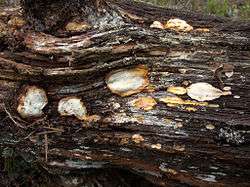Antrodia
| Antrodia | |
|---|---|
| | |
| Antrodia serialis | |
| Scientific classification | |
| Kingdom: | Fungi |
| Division: | Basidiomycota |
| Class: | Agaricomycetes |
| Order: | Polyporales |
| Family: | Fomitopsidaceae |
| Genus: | Antrodia P.Karst. (1879)[1] |
| Type species | |
| Antrodia serpens (Fr.) P.Karst. (1879) | |
| Species | |
|
~50 | |
| Synonyms[2] | |
Antrodia is a genus of fungi in the family Fomitopsidaceae. Antrodia species have fruit bodies that typically resupinate (i.e., lying flat or spread out on the growing surface), with the hymenium exposed to the outside; the edges may be turned so as to form narrow brackets. Most species are found in temperate and boreal forests, and cause brown rot.
Description
Antrodia are effused-resupinate, that is, they lie stretched out on the growing surface with the hymenium exposed on the outer side, but turned out at the edges to form brackets. When present, these brackets are typically white or pale brown. The pores on the surface of the hymenium may be round or angular. The context is white or pale. All species cause brown-rot. Typically, basidiospores are thin-walled, cylindrical, and narrowly ellipsoidal or fusiform in shape.[5] Most species grow on the wood of coniferous trees, except for A. albida, which grows on the dead wood of deciduous trees.[6]
Phylogeny
In order to reliably identify the various species and strains of medicinal Antrodia, genetic markers have been developed and phylogenetic analyses performed.[7] These analyses have demonstrated that there are three distinct phylogenetic lineages within the Antrodia genus.
Classification
The modern definition of the genus follows the description given by Gilbertson and Ryvarden (1986), in their monograph North American Polypores.[8]
Distribution
Roughly twenty-nine species are known from Europe,[9] 21 species in North America,[8] and 18 species in East Asia,[10] although more new species have been reported since the time of these publications.
Species

There are about 50 species in this genus:
- Antrodia albida
- Antrodia albidoides
- Antrodia albobrunnea
- Antrodia alpina
- Antrodia aurantia[11]
- Antrodia bambusicola – China[12]
- Antrodia calceus
- Antrodia carbonica
- Antrodia cinnamomea
- Antrodia conchata
- Antrodia crassa
- Antrodia daedaleiformis
- Antrodia eutelea
- Antrodia ferox
- Antrodia gossypium
- Antrodia heteromorpha
- Antrodia hingganensis
- Antrodia hippophaes
- Antrodia huangshanensis
- Antrodia hyalina – Russia[13]
- Antrodia infirma – Europe[14]
- Antrodia juniperina
- Antrodia lalashana[15]
- Antrodia leucaena –China, Europe[5]
- Antrodia macra
- Antrodia macrospora
- Antrodia madronae – Western USA[16]
- Antrodia malicola
- Antrodia mellita
- Antrodia minuta
- Antrodia multipapillata
- Antrodia novae-zelandiae
- Antrodia oleracea
- Antrodia parvula
- Antrodia pictilis
- Antrodia pini-cubensis
- Antrodia plicata
- Antrodia porothelioides
- Antrodia pseudosinuosa
- Antrodia pulverulenta
- Antrodia pulvinascens
- Antrodia ramentacea
- Antrodia rhizomorpha
- Antrodia rupamii
- Antrodia sandaliae
- Antrodia serialiformis
- Antrodia serialis
- Antrodia sinuosa
- Antrodia sitchensis
- Antrodia sordida
- Antrodia stratosa
- Antrodia subalbidoides
- Antrodia submalicola
- Antrodia subramentacea
- Antrodia subxantha
- Antrodia taxa
- Antrodia terryi
- Antrodia tropica – China[17]
- Antrodia variiformis
- Antrodia wangii
- Antrodia xantha
References
- ↑ Karsten P. (1880). "Symbolae ad Mycologian Fennicam 6.". Meddelanden af Societatis pro Fauna et Flora Fennica (in Latin). 5: 15–46.
- ↑ "Synonymy: Antrodia P. Karst.". Species Fungorum. CAB International. Retrieved 2014-08-17.
- ↑ Murrill WA. (1905). "The Polyporaceae of North America: XII. A synopsis of the white and bright-colored pileate species". Bulletin of the Torrey Botanical Club. 32 (9): 469–93 (see p. 481). doi:10.2307/2478463.
- ↑ Kotlába F, Pouzar Z (1958). "Polypori novi vel minus cogniti Cechoslovakiae III". Ceská Mykologie. 12 (2): 95–104.
- 1 2 Dai YC, Niemelä T (2002). "Changbai wood-rotting fungi 13". Antrodia sensu lato". Annales Botanici Fennici. 39: 257–265.
- ↑ Ellis JB, Ellis MB (1990). Fungi without Gills (Hymenomycetes and Gasteromycetes): An Identification Handbook. London, UK: Chapman and Hall. p. 27. ISBN 0-412-36970-2.
- ↑ Chiu HH. (2007). "Phylogenetic analysis ofAntrodia species and Antrodia camphorata inferred from internal transcribed spacer region". Antonie van Leeuwenhoek. 91 (3): 267–76. doi:10.1007/s10482-006-9116-4. PMID 17072535.
- 1 2 Ryvarden L, Gilbertson RL (1986). North American Polypores. Oslo, Norway: Fungiflora. ISBN 0-945345-06-2.
- ↑ Ryvarden L, Gilbertson RL (1993). European polypores 1. Synopsis Fungorum. 6. pp. 1–387.
- ↑ Núñez M, Ryvarden L (2001). East Asian polypores 2. Polyporaceae s. lato. Synopsis Fungorum. 14. pp. 170–522.
- ↑ Lodge DJ, Ryvarden L, Perdomo-Sanchez OP (2001). "Studies in neotropical polypores 11: Antrodia aurantia, a new species from the Dominican Republic, greater Antilles". Mycotaxon. 80: 261–6.
- ↑ Cui BK, Li HJ, Dai YC (2011). "Wood-rotting fungi in eastern China 6. Two new species of Antrodia (Basidiomycota) from Mt. Huangshan, Anhui Province". Mycotaxon. 116: 13–20. doi:10.5248/116.13.
- ↑ Spirin V, Miettinen O, Pennanen J, Kotiranta H, Niemela T (2013). "Antrodia hyalina, a new polypore from Russia, and A. leucaena, new to Europe". Mycological Progress. 12 (1): 53–61. doi:10.1007/s11557-012-0815-0.
- ↑ Renvall P, Niemela T (1992). "Basidiomycetes at the timberline in Lapland 3. Two new boreal polypores with intricate hyphal systems". Karstenia. 32: 29–42.
- ↑ Chang TT, Chou WN (1997). "Antrodia lalashana sp. nov. and Antrodiella formosana sp. nov. in Taiwan". Mycological Research. 102: 400–2. doi:10.1017/s0953756297005157.
- ↑ Vlasák J, Vlasák J Jr, Ryvarden L (2012). "Four new polypore species from the western United States". Mycotaxon. 119: 217–31. doi:10.5248/119.217.
- ↑ Cui BK. (2013). "Antrodia tropica sp. nov. from southern China inferred from morphological characters and molecular data". Mycological Progress. 12: 223–30. doi:10.1007/s11557-012-0829-7.